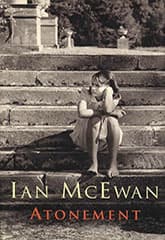Atonement
Critique • Quotes • At the movies
 First edition
First editionFirst publication
2001
Literary form
Novel
Genres
Literary, historical fiction
Writing language
English
Author's country
England
Length
Approx. 123,500 words
Roller coaster for heart and mind
It's hard not to think "classic" as you're reading Atonement. Especially in the first half with its scenes of country estate life, reminiscent of Jane Austen or the Brontë novels, as experienced through the perspective of a thirteen-year-old girl, Briony Tallis.
The epigraph to Ian McEwan's novel is actually a passage from Northanger Abbey, introducing Austen's frequent theme of misjudgment, which is to play out in Atonement. And on the first page of the novel Briony is working on a play to be presented by the children to their extended family—The Trials of Arabella, whose message is "love which did not build a foundation on good sense was doomed", the kind of naïve proclamation many a sensible Austen heroine would make.
Naturally, also in the Austen tradition, the supposedly sensible one, Briony in this case, herself jumps to faulty conclusions that wreck someone's romantic hopes. However, in Atonement she complicates the misunderstanding with an outright lie, which she feels is justified. And the consequences are far more serious than in any Austen novel. Her words result in the imprisonment of an innocent young man for rape.
McEwan's writing in this first half of Atonement performs a similar function of creating the illusion of an old-fashioned novel while belying it with more realistic touches. The story's leisurely pace, detailed descriptions and clever sentence structures make it feel it's taking place a century earlier than 1935, in which it's really set. But the story is jerked into the modern era by the explicitness of the material, some of the dialogue, and the psychological character of the girl's inner narration—more reminiscent of modern stream-of-consciousness writers than of Austen's time. The overall effect is of unsettledness, a vague feeling that undercuts the young girl's smug satisfaction in having done a good thing.
It's a virtuoso performance by McEwan.
And then he upends the illusions he's created—not once, not twice, but thrice—with two shorter parts set in the Second World War and a postscript set in 1999. Atonement turns into what some have called metafiction, a narrative about narrative, with an unreliable narrator to boot.
In case that discourages you, on the plus side, the pace does pick up in the second half, as befits a modern novel, and the writing is all grippingly readable.
The second and third sections follow the adult Briony in her attempts to find redemption and the remaining lives of the people she wronged. The story appears to be more objectively told, though at times it sinks into romantic melodrama. Especially movingly drawn are the apparent last days of the unjustly jailed young man, now a soldier in 1940, wounded and fleeing the Germans during the British rout to Dunkirk, dreaming only of seeing his lover again.
But this and other dramas in Briony's search for absolution also are illusory as we find out in the final upending of Atonement's postscript. Even down to the last couple of pages new revelations raise doubt on what's gone before.
To reality and beyond
Or do they? It's not clear what we're supposed to trust as the true account by this point. But this uncertainty is not annoying, as stories with the-lady-or-the-tiger endings often are. It does feel by the end of Atonement seventy-seven-year-old Briony has resolved to finally come clean on what really happened, although we don't know if she can or will. But we've reached some kind of truth, some kind of shaky acceptance of our inability to change our pasts, or change their effect on our presents and futures.
It's an intellectual and emotional roller coaster, to say the least. Without a comfortable landing. Which makes me wonder if it's intended as a parody on those eighteenth-century novels it seems to be copying in the long opening section, those novels with heroines redeemed, all loose ends wrapped up, and everyone getting their just desserts.
Or is McEwan just honouring the realism that those old works had introduced in their time and extending it beyond the limits that confined those earlier literary greats? While we think of those novels today as akin to Gothic romances, they really were written as a reaction against the Romantic (with a capital R) excesses of previous generations of writers.
Writers since then, for the most part, have taken realism further into what is often called naturalism—which in literary terms carries connotations of being determined by natural and social circumstances, of pessimism about being able to slip the causal chains. In Atonement we see the psychological forces driving Briony and, to an extent, others. And we experience disappointments in her attempts to change or evade the consequences of her actions. Repeatedly we are led to the edge of what seems to be redemption of a sort, only to have it revealed as false.
All this may leave the impression Atonement is one dreary, difficult novel, enjoyable only for the literati and academics familiar with the history of Western literature.
Far from it. McEwan's writing is so good—both accomplished and accessible—that anyone with a heart and mind is welcome on the ride.
— Eric
Critique • Quotes • At the movies

